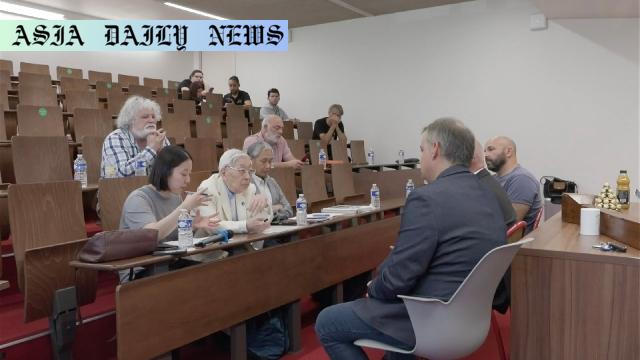Nuclear Abolition: Hiroshima survivor urges scientists in France to take action for the elimination of nuclear weapons.
Hiroshima survivor Tanaka Satoshi visited France to urge scientists to support nuclear disarmament.
He engaged with the University of Montpellier regarding the responsibility of science in abolishing nuclear weapons.
Scientists debated the ethical implications of their research being used for nuclear purposes.
Tanaka emphasized the decline in peace research and the need for global mindset shifts to eliminate nuclear arms.

The Enduring Message of Hiroshima
Eighty years after the atomic bomb devastated Hiroshima, the memory of its destruction still fuels the message of nuclear abolition. Satoshi Tanaka, a survivor of the attack, continues to advocate for a world free of nuclear weapons. His recent visit to the University of Montpellier in southern France serves as a powerful reminder of the responsibility borne by scientists and societies in shaping the future. At just one year old, Tanaka witnessed one of history’s most profound tragedies. Today, he uses his platform with Nihon Hidankyo, an organization representing survivors of Hiroshima and Nagasaki, to promote global peace and disarmament.
A Call for Ethical Science
During his visit, Tanaka engaged with researchers and university officials, addressing the moral implications of nuclear weapon development. A mathematician at the meeting highlighted the unsettling reality that mathematical research inadvertently contributes to the advancement of destructive technologies. This revelation underscores the ethical dilemmas faced by scientists, many of whom struggle to reconcile their work’s potential applications with their personal values. Tanaka’s poignant appeal emphasized that the power of science must be wielded for peace, urging scientists to consciously align their research with humanitarian principles.
Changing Mindsets for a Nuclear-Free Future
Francois Pierrot, Vice President of the University of Montpellier, acknowledged the historical perspective that nuclear weapons act as a deterrent to conflict—a belief that still resonates among some in France. However, recent geopolitical tensions, such as those involving Russia, have reignited fears, making disarmament seem more challenging. Pierrot noted the importance of changing public opinion and fostering a collective ambition toward nuclear abolition. Tanaka’s presentation aims to inspire not only scientists but also the broader population to advocate for a more sustainable and secure future.
Empowering Scientific Advocacy
After the discussion, Tanaka expressed hope that scientists would influence policymakers to prioritize disarmament. He believes that the combined efforts of researchers, peace activists, and governments could pave the way for meaningful change. Nihon Hidankyo’s Nobel Peace Prize recognition amplifies the survivor community’s voice, demonstrating the global resonance of their mission. Tanaka’s plans to return to Japan and rally international leaders and researchers showcases his unwavering commitment to a nuclear-free world.
The Path Forward
As Tanaka prepares to renew his appeals to nuclear powers, the global community faces a crucial challenge: to balance technological progress with ethical responsibility. His call for a concerted effort among scientists, activists, and policymakers transcends national boundaries, emphasizing the universal stakes in the abolition of nuclear weapons. The echoes of Hiroshima’s devastation serve as a solemn reminder of what is at risk should the world fail to heed this urgent message. By fostering dialogue and collaboration, humanity can strive to prevent the repetition of history’s gravest mistakes.



Commentary
The Moral Responsibility of Scientists
The discussion surrounding nuclear abolition raises profound ethical questions, particularly for scientists who contribute to technological advancements. While the pursuit of knowledge is a driving force in scientific fields, it is imperative to consider the directions in which this knowledge is applied. Tanaka Satoshi’s conversation with mathematicians and physicists at the University of Montpellier serves as a wake-up call to the scientific community. It emphasizes the importance of aligning research with humanitarian goals, rather than inadvertently empowering weapons of mass destruction.
Shifting Perspectives Amidst Geopolitical Challenges
One of the most striking elements of this dialogue is the acknowledgment by Francois Pierrot that many still view nuclear weapons as a deterrent. This perspective, deeply ingrained in certain societies, poses a significant barrier to disarmament efforts. However, by fostering education and promoting alternative security strategies, such mindsets can evolve. Tanaka’s efforts serve as a catalyst for this much-needed change, bridging gaps between survivors’ harrowing experiences and the policy decisions that shape our future.
Hope for a Nuclear-Free Future
What stands out most about Tanaka’s advocacy is his steadfast hope in the face of adversity. Despite the declining numbers of peace researchers and the challenges posed by modern geopolitics, his resolve remains unshaken. His message is not only a call to scientists but to all individuals who believe in the possibility of a more peaceful world. By amplifying survivors’ voices and promoting global collaboration, Tanaka exemplifies the power of resilience and moral conviction in driving societal change.